

Sometimes the research and scholarship that we professors do takes us far away from our campus in Queens. I’m back in Queens this semester after spending fall ’22 as a research fellow at the Rachel Carson Center in Munich, Germany. I want to tell my St. John’s community about what happened on the other side of the pond.
A quick note first about the purpose behind this sorts of trips. It’s not that I don’t love teaching SJU students and working with our community in New York. I might note, too, that, through the magic of Zoomtopia, I stayed in contact with several graduate students working on long-term projects while I was overseas. I was part of a remote dissertation defense in October (during my isolation period while not-too-sick with Covid), and I picked up a new McNair undergraduate student mentee while I was away. But the research life of any professor is global in scope, and the insights and networks that I connected with during my time in Europe were massively stimulating, not just for my published research agenda but also for reinvigorating my teaching and community support work here in NYC.
During my leave in F22, I was a residential fellow at the Rachel Carson Center in Germany. I lived in the “Landhaus” in the Bavarian countryside, in an old family farmhouse that has recently been retrofitted to host ten international scholars. We each had our own bedrooms and bathrooms – that was very handy during my Covid isolation! – but we shared a kitchen and often cooked and ate together. The other fellows spanned the globe – Akin from Nigeria, Tamara from Sri Lanka (by way of Cambridge University in the UK), others from India, Hawai’i, California, Wales, different parts of Germany, and elsewhere. There was some friendly tension during the World Cup, especially when the USA beat England 1-1 (a soccer joke), but it was great to have a window into intellectual and academic life around the world. Probably the least concrete but most valuable aspect of this fellowship was seeing how scholars from widely different backgrounds share ideas, methods, and points of view.
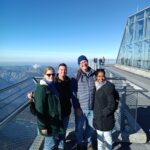
The Rachel Carson Center itself, which has its main office in downtown Munich, is the brainchild of Professor Christof Mauch, a German historian who specializes in the environmental history of America. Christof enjoys explaining the name that he chose for the center by saying that most academic organizations in Germany are named for old white German men, and his choice of Rachel Carson, an American woman and public environmentalist hero, distinguishes the kind of work he wants the RCC to support. The center brings together scholars from various places at different career stages, from MA and PhD students to visiting and permanent faculty. Now that I’ve been a residential fellow, I am automatically enrolled as a member of the RCC Society of Fellows, which means that I will stay in contact with the center and possibly participate in and/or help organize future events.
The RCC revolves around a series of weekly events in and near Munich. Each of the fellows gives a public lunchtime lecture on a Thursday. (Here’s a link to mine on the RCC YouTube channel, from November 17.) The center also hosts weekly works-in-progress sessions on Tuesdays. I organized two of those Tuesday events, one on an emerging project of mine about poetry and Moby-Dick in November, and a spontaneous memorial session in October that we shoe-horned into the schedule when we learned of the death, on Oct 9, of the great French environmental philosopher Bruno Latour. Both events brought together different parts of the RCC community to talk about shared ideas, in the case of the Latour session, and about my work in progress, in the November session.
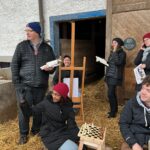
The RCC also hosts public lectures and multiple small events and conferences. In early October, just a few days after I arrived, I attended an amazing day-long conference on the “noosphere,” an environmental concept invented by the French Jesuit philosopher Teilhard de Chardin and elaborated by the Soviet ecologist Vladimir Vernadsky. One of the major speakers at the conference was a Russian environmental historian who had recently, with several of her graduate students, fled Russia in the aftermath of the invasion of Ukraine. In fact, one notable thing about being in Germany during the fall of ’22 was how much closer the Ukrainian conflict felt, from the presence of refugees that made housing for international PhD students hard to find to anxieities about the price of keeping apartments warm during the winter. I remember meeting a very cute corgi dog on the street, and having the owner explain proudly, in really quite good English, that this was a “Ukraine dog,” who had come into exile with her to Germany after the invasion.
The central academic work that I undertook at the RCC was advancing my research agenda, which focuses on the long cultural relationships between humans and water in all its forms. The “blue humanities,” which is what I’ve been calling this academic discourse since the late 2000s, seems alive and thriving in Europe, especially in centers for environmental studies like the RCC. I am happy to report that during my semester in Germany, I published two new articles about the current state of the blue humanities, “A Poetics of Planetary Water,” in the new international Coastal Studies and Society Journal, and “Blue Humanities,” in the massive Palgrave Handbook of Critical Posthumanism, edited by a teach of scholars including Stefan Herbrechter of Heidelberg University.
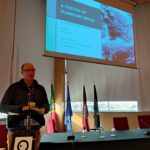
My primary accomplishment, however, was completing the manuscript of An Introduction to the Blue Humanities, which will appear from Routledge Publishing in July 2023. This book, which will be the first textbook published in this thriving new academic subfield, aims to introduce scholars and students to the features, methods, and benefits of thinking with water across all its forms and histories. Many people I met in Europe this past fall seemed eager to use it in their teaching!
Finally, I was extremly pleased to publish, during my time in Germany, my first-ever purely creative work, the poetry chapbook Swim Poems, published by Ghostbird Press in October. I received the author copies of the poetry book exactly one day before I tested positive for Covid, so I had the company of that lovely little volume during my week of isolation on the farm.
In addition to these publications, I tried to circulate as widely as I could when I was in Europe, sharing my ideas and being in dialogue with faculty and students at environmental humanities centers throughout the continent. This travel was exhausting and exhilarating. I ended up giving six public lectures and multiple workshops in five countries: first in the lovely medieval town of Poitiers, France, in October; twice in Germany, at the RCC in November and at the University. Of Bremen near the Baltic coast in December; a keynote lecture from the tip of a surf-swept peninsula in Peniche, Portugal (just down the coast from Nazare, where they surf the 100-foot waves) on Thanksgiving Day; another public lecture at the Greenhouse in Stavenger, Norway, in early December; and a last lecture at the Environmental Humanities program at Ca’ Foscari University in Venice in mid-December, just before I came home. The Stavanger trip was particularly exciting, not only because I’d never been to Norway, but also because the very active Environmental Humanities program there (“the Greenhouse”) was teaching its first-ever Blue Humanities course to European graduate students, at which I’d been invited to be the inaugural guest professor.
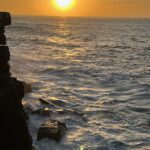
One thing that struck me about how humanities research in Europe differs from United States was the number of multi-year, multi-person projects funded by international or national bodies, often the EU but also various national governments. These projects, like the 4Oceans project that hosted me in Portugal and the Greenhouse in Norway, bring together scholars from all over the world. The connections I made during this semester will shape my research and teaching for the rest of my career.
I’m pleased to be back in the United States and teaching in-person on my beloved Queens campus once again. My time at the Rachel Carson Center has cemented academic and personal relationships that will sustain my research moving forward. I’ve also been given a glimpse into ways of thinking and practicing environmental scholarship that will benefit me, my students, and my colleagues in the future.
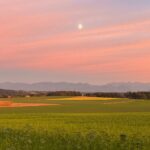
It would not have been possible to take up this fellowship without the enthusiastic support of St. John’s University, including my colleagues in the English department and the Deans in St. John’s College of Arts and Sciences. I’m so pleased to have been able to live out SJU’s global mission, and to bring the fruits of those conversations and collaborations, past and future, back to our University.

Leave a Reply